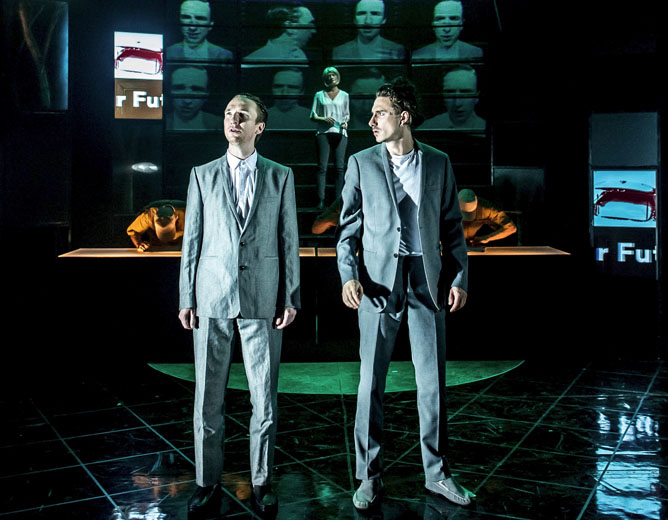There used to be a golden age of young British playwrights, about fifty years ago, which has never happened again. Of course, there have been excellent playwrights since but there has never been that zeitgeist, that feeling of a movement. That said, there are currently a couple of young, much lauded wunderkinder English writers, both of whom we have seen recently.
One is Barney Norris, whose new play Eventide will soon be reviewed on these pages and the other is Dawn King whose Ciphers was at the Everyman exactly two years ago. Her new work is an adaptation of Aldous Huxley’s Brave New World which is currently on tour.
Brave New World, although dealing with similar themes to 1984, was sensible enough not to identify itself in a time period so specific as to make watching a play about what we all know didn’t happen thirty years ago a bit daft (à la 2001 – A Space Odyssey). The world depicted in the story is one where people are created in laboratories to fulfil certain tasks – top of the pile are the Alphas (no, not cars) and at the bottom are the Epsilons who are created without a sense of smell so they can work in the sewers.
Life consists of work and promiscuous sex (everyone belongs to everyone and the concept of parenting is a joke). Without a care in the world they go about their daily lives, unaware that they are missing their freedom and the better things in life which seemed to consist mainly of Shakespeare. The story owes a lot to The Tempest from whence its title comes and which has been used more than once as inspiration for science fiction stories.
So, what of this adaptation and production? The presentation of the future as a clean, characterless place where all the work surfaces are constantly wiped and spotless has become a bit of a cliché – it is my experience that the “easier” life becomes the more slovenly people become. The set was all screens, projections and crisp, staccato scenes where characters froze while others spoke. It was about people who had no soul, no spirit, but when a “savage” from some distant place where old values and styles pertained was introduced he was treated as a celebrity. I think it is all very well depicting a soulless world but the production itself must not be soulless.
This was the problem I had with the play, it was sterile and lacked life – much the same issue I had with Ms King’s other play, Ciphers. Both plays were all very prim and proper, everything was very clean and in the right place but they lacked any sort of edge, they were played by the book. If you asked a group of people at random to visualise Brave New World I bet the majority of them would come up with something like this. It lacked balls and any sort of wow factor; it was entirely predictable. For what it was, it was well enough done and there was an excellent soundtrack from These New Puritans, but overall it did not grab me, I felt no involvement or connection with the characters and, worst of all, I didn’t care what happened to them. Theatre is character, not event based, it is the characters that you have to relate to, not a flashy set, a clever concept and loud music. A bit of life, that’s what’s needed. ★★★☆☆ Michael Hasted 21st October 2015
Photo by Manuel Harlan


